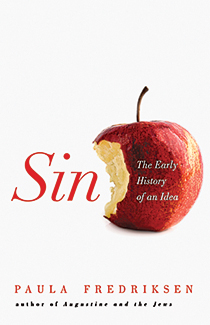 Our idea of sin—what it is, what it does to us and others—says a lot about our idea of human nature. And, as such, it’s always a moving target. Fredriksen, an eminent American religious scholar, notes that Jesus announced good news to his world: God was about to redeem it. Yet 350 years later, the Church founded in his name proclaimed that the greater part of humanity was condemned for all eternity. Sin is Fredriksen’s take on how Christianity got from one pole to the other.
Our idea of sin—what it is, what it does to us and others—says a lot about our idea of human nature. And, as such, it’s always a moving target. Fredriksen, an eminent American religious scholar, notes that Jesus announced good news to his world: God was about to redeem it. Yet 350 years later, the Church founded in his name proclaimed that the greater part of humanity was condemned for all eternity. Sin is Fredriksen’s take on how Christianity got from one pole to the other.
She tells her story of “dramatic mutations in Christian ideas about sin” by examining seven key figures: Jesus and St. Paul; three early second-century innovators (Justin, Valentinus and Marcion); and the ancient Church’s two theological titans, Origen and Augustine. Of the latter two, Fredriksen argues, Origen came to represent the road not taken, while Augustine looms over subsequent Christian thought, and hence over much of Western intellectual history.
For Jesus and Paul, in the era of the Gospels, sin is primarily a matter of breaking the commandments. But remedy—urgently required because the Kingdom of God is near—is also at hand: repentance, immersion, prayer, ritual sacrifice. More than a century later, when the end times were no longer considered imminent, theologians like Valentinus and Justin thought of sin in terms of what it meant to individual salvation after death. If sin was, as they taught, a matter of ignorance of God’s will, far fewer would be saved. And that number fell still further when Augustine triumphed over Origen, whose freewheeling speculations often seemed to indicate a belief that God would someday become reconciled with all his creatures.
Augustine’s belief that sin was an essential part of our now corrupted human nature—thanks to Adam and Eve’s original sin—sank deep into Western cultural DNA. We may not see sin in ourselves any more, Fredriksen notes after surveying public apologies that tend to regret “mistakes” rather than wrongdoing, but we certainly still recognize it in others.
Here’s where you can find the current Maclean’s bestsellers list, plus all of our books reviews.